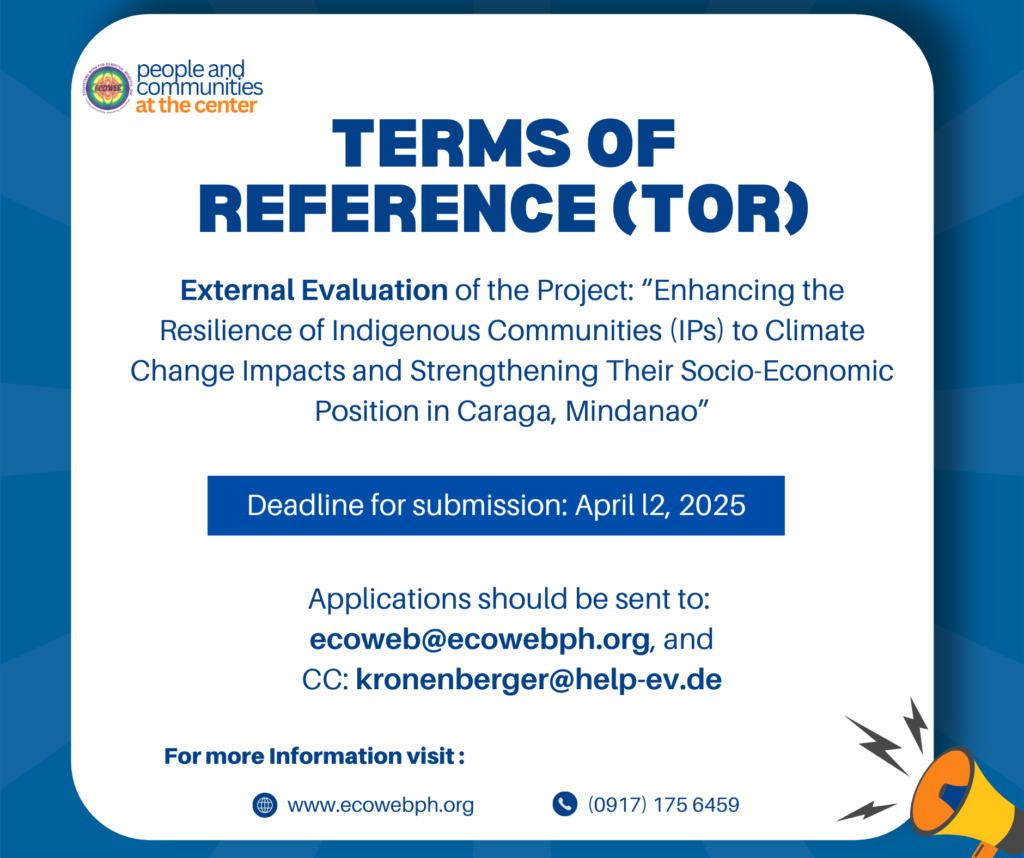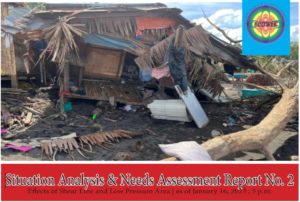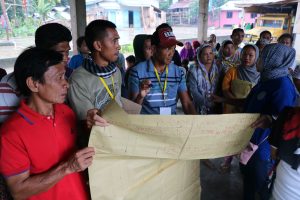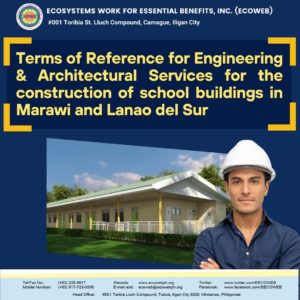This content has been archived. It may no longer be relevant

1. Background
The project, implemented from November 1, 2022, to April 30, 2025, aims to strengthen the resilience of indigenous communities (IPs) in the Caraga region of Mindanao, Philippines, through land tenure security, socio-economic empowerment, climate change adaptation, and disaster risk reduction. This is being executed by ECOWEB with financial support from bengo/Engagement Global and in collaboration with Help – Hilfe zur Selbsthilfe e.V..
In particular the project covers indigenous communities in CADT 117 and CADT 090 in the municipalities of La Paz and Loreto respectively.
To assess the impact, effectiveness, and sustainability of the project, an external evaluation will be conducted to provide an independent and objective assessment of the project’s progress, achievements, and challenges.
2. Objectives of the Evaluation
The evaluation will aim to:
- Assess the relevance, effectiveness, efficiency, impact, and sustainability of the project based on the OECD-DAC criteria.
- Evaluate the extent to which the project has contributed to strengthening the resilience of indigenous communities in Caraga, including:
- Recognition of land and resource rights of indigenous peoples.
- Strengthening of Indigenous Political Structures (IPS).
- Formulation and implementation of Ancestral Domain Sustainable Development and Protection Plans (ADSDPPs).
- Promotion of climate-resilient livelihoods.
- Integration of Disaster Risk Reduction (DRR) and Climate Change Adaptation (CCA) into IP community planning.
- Analyze the efficiency and effectiveness of implementation strategies, including collaboration with government agencies (NCIP, DENR, DAR, etc.) and other stakeholders.
- Identify key lessons learned, best practices, and areas for improvement to guide future programming.
- Assess the project’s contribution to relevant Sustainable Development Goals (SDGs), particularly SDG 1 (No Poverty), SDG 2 (Zero Hunger), SDG 13 (Climate Action), and SDG 15 (Life on Land).
3. Scope of Work
The evaluation will cover:
- The project’s geographical scope: Two ancestral domains in the municipalities of La Paz and Loreto, Agusan del Sur, Caraga region.
- Target groups: Indigenous Manobo communities, IPS members, non-IP stakeholders, local government units (LGUs), and partner organizations.
- Thematic areas:
- Land tenure security and registration of Certificates of Ancestral Domain Titles (CADT).
- Strengthening of Indigenous Governance (IPS).
- Sustainable livelihoods and social enterprise development.
- Climate change adaptation and disaster preparedness.
- Gender and social inclusion.
- Institutional collaboration and policy advocacy.
4. Evaluation Criteria & Key Questions
The evaluation will be guided by the OECD-DAC criteria:
1. Relevance
- To what extent is the project aligned with the needs and priorities of indigenous communities?
- How well does the project fit within the policy frameworks of the Philippine government and international commitments to indigenous rights and climate resilience?
2. Effectiveness
- To what extent has the project achieved its objectives (e.g., ADSDPP formulation, IPS capacity-building, and livelihood improvements)?
- What factors have facilitated or hindered the achievement of results?
- Has the project contributed to conflict-sensitive and participatory governance within IP communities?
3. Efficiency
- Were resources (financial, human, material) used efficiently to deliver expected results?
- Were project activities cost-effective compared to alternative approaches?
- How well was the project managed and coordinated among partners?
4. Impact
- What are the positive and negative impacts of the project on target communities?
- Has the project contributed to improved land tenure security, economic empowerment, and climate resilience?
- How has the project influenced local and national policies on indigenous rights and development?
5. Sustainability
- What mechanisms have been put in place to ensure the continuity of project interventions after its completion?
- Are local institutions (IPS, LGUs, government agencies) equipped to sustain and scale up the project’s initiatives?
- How likely are project benefits to persist in the long term?
5. Methodology
The evaluator is expected to use a mixed-methods approach, including:
- Document review (project proposal, reports, ADSDPPs, training materials).
- Key informant interviews (KIIs) with project staff, IPS leaders, LGU representatives, NCIP, DENR, DAR, and community stakeholders.
- Focus group discussions (FGDs) with indigenous community members.
- Field visits and direct observations in the target communities.
- Surveys (if needed) to assess project impact quantitatively.
- Case studies on successful interventions and challenges.
6. Deliverables & Timeline
| Deliverable | Description | Estimated Timeline |
| Inception Report | Detailed methodology, work plan, evaluation tools, and proposed field visit schedule. | Within 1 week of contract signing |
| Data Collection | Field visits, interviews, focus group discussions, surveys, and observations. | Week 2-3 |
| Preliminary Findings Report | Presentation of initial findings and recommendations to ECOWEB and Help. | Week 6 |
| Draft Evaluation Report | Comprehensive report including analysis, conclusions, and recommendations. | Month 7 |
| Final Evaluation Report | Incorporating feedback from ECOWEB and Help, along with an executive summary and recommendations. | Month 8 |
7. Qualifications & Experience
The evaluator(s) must have:
- Advanced degree in development studies, anthropology, environmental science, public policy, or a related field.
- At least 5 years of experience in evaluating development projects, particularly in:
- Indigenous rights and governance.
- Climate change adaptation and DRR.
- Sustainable livelihoods and rural development.
- Strong knowledge of indigenous peoples’ rights frameworks, including the Indigenous Peoples Rights Act (IPRA) and UNDRIP.
- Experience with qualitative and quantitative research methods.
- Familiarity with the socio-political context of the Philippines and Mindanao.
- Ability to produce high-quality reports in English.
8. Budget & Payment Schedule
The total budget for the evaluation will be determined based on proposals submitted by applicants.
| Payment Milestone | Percentage |
| Upon signing of contract and submission of inception report | 30% |
| Upon completion of data collection and presentation of preliminary findings | 40% |
| Upon submission and approval of final evaluation report | 30% |
9. Application Process
Interested evaluators or firms should submit:
- Technical proposal (methodology, work plan, proposed team, budget).
- CV(s) of lead evaluator and key team members.
- Sample evaluation report from a previous similar assignment.
- Financial proposal with detailed cost estimates.
Deadline for submissions: April 12, 2025
Submissions to be sent to email: ecoweb@ecowebph.org, cc. kronenberger@help-ev.de
10. Ethical Considerations
The evaluator must adhere to ethical research principles, including:
- Informed consent from all participants.
- Ensuring confidentiality and anonymity.
- Cultural sensitivity when engaging with indigenous communities.



